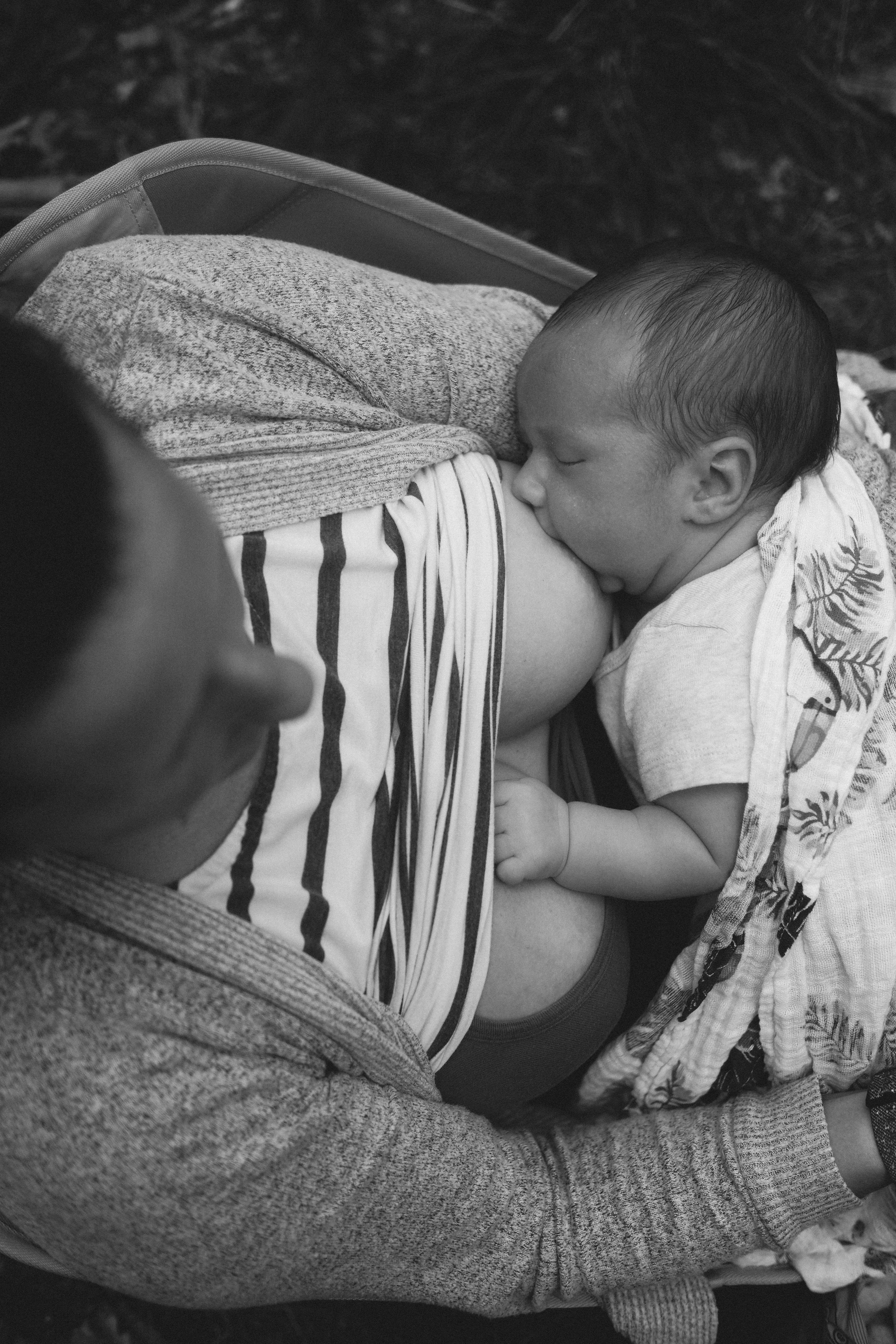
The impact of food insecurity on infant feeding in the UK
#OutOfMilk
“They always put their children first. They all put their children
first before feeding themselves”
Over the last 18 months there has been much public focus on the issue of formula poverty. However, despite international research having explored the impact of poverty on women’s infant feeding experiences in a wider context, little attention has been paid to the impact of food insecurity on infant feeding in the UK.
With that in mind, Feed launched our Out of Milk inquiry to gather information on whether food insecurity has impacted women’s infant feeding experiences in the last year, and to look at some of the factors that influence infant feeding in the UK today. We also sought to gain an understanding of how professionals who work with families are able to support families living in food insecurity with infant feeding , and identify where there may be gaps in understanding.
#OutOfMilk hashtag was used with permission by Prof Lesley Frank, whose book Out of Milk explores infant food insecurity in Canada. Thank you Prof Frank.
Summary of Findings
Key Findings
The cost-of-living crisis has impacted on all infant feeding experiences both breastfeeding and formula feeding.
Women experiencing food insecurity initiate breastfeeding at a similar rate as food secure women.
Women experiencing food insecurity seek infant feeding support at a similar rate to food secure women. Women experiencing food insecurity are more likely to stop breastfeeding than food secure women in part due to concerns over milk quality because of a poor maternal diet.
Most women who use formula milk had not planned to. Budgeting for the additional cost of formula milk is adding financial and psychological pressures, disproportionately impacting food insecure families.
Some groups face additional barriers with infant feeding including women living with HIV and those with no recourse to public funds.
Key Recommendations
Increase the value of the Healthy Start Scheme and widen the eligibility criteria in line with the free school meal criteria.
Work across sectors and with public involvement to build systems, policies and practices to help identify the scale and nature of the impact of food insecurity on infant feeding, and to improve prevention and support for those in need,
Take a person-centred approach to infant feeding policies and practices within the antenatal and postnatal periods, recognising the impact of poverty and food insecurity.
Promote public health messaging on the nutritional equivalence of all first infant formula milks.
Develop a not for profit infant formula milk to address the cost of formula, as well as the wider issues that result in families facing barriers to accessing this vital product.
“We have some mothers who are going without food for themselves due to food poverty, so that they can buy formula”
Families with children under 12 months of age are at increased risk of household food insecurity, where appropriate foods cannot be obtained in socially acceptable ways, with nearly 14% of households in the UK food insecure. Rising prices of both food and energy, combined with the fact that benefits such as Healthy Start have not kept up with inflation, have exacerbated the issue. Public health policy positions women and their bodies as the default producers of sustenance for their infant, and breastfeeding is often cited as a free, secure food source for babies. This perspective fails to account for the costs to women and their families of breastfeeding ; physiological, emotional, financial and nutritional. Despite the majority of women wanting to breastfeed, almost all babies in the UK are fed formula to some degree by the time they are 6-8 weeks old. As the cost of infant formula has skyrocketed, families are feeling the strain of this unexpected expense, with many struggling to access formula for their babies. To date, there has been an inadequate focus on how these challenges may vary according to women’s own access to food and nutrition. This study is the first in the UK to attempt to address that gap.
“Not eating properly makes having a good breastmilk supply challenging”
This study aimed to look at the role food insecurity played in infant feeding experiences. We use the word experiences as opposed to choices carefully, because it became clear in the course of this research that many women did not feel they were making choices but rather dealing with the hand they were dealt. For women who had intended to breastfeed but ultimately formula fed because of the challenges experienced, it often did not feel like a choice but a necessity. For some women who wanted to switch to formula feeding but stayed with breastfeeding because of the escalating costs of infant milk, it felt like a restriction on their own bodily autonomy.
This research shows babies living in food insecure households are 2.6 times less likely to be exclusively breastfed, despite women experiencing food insecurity having a similar rate of breastfeeding intention as food secure women; 53% of women experiencing food insecurity who intended to breastfeed either formula fed or combination fed their babies after birth, compared with 29% of food secure women. Food insecure mothers introduced formula milk in part due to concerns over their own milk quality and supply because of their own poor dietary intake. These challenges were experienced despite the fact that women experiencing food insecurity and who intended to breastfeed, were no less likely to seek breastfeeding support than their food secure counterparts, highlighting that the solution may not lie simply in expanding existing support.
There were a number of consequences of not meeting initial feeding intentions, including the unexpected toll of the cost of infant formula. Many of the families who responded to our survey were worried about the cost of formula (43.7% overall), but 69.1% of those in food insecure households were worried about being able to afford formula compared to 26.3% in food secure homes.
Given the strong narrative that breastfeeding can be provided by women for free, it is unsurprising that this caused feelings of guilt and shame for some women because of the impact it had on wider family finances alongside a sense of not providing what is “best” for their baby.
“I expected to be able to breastfeed and when it became clear my baby needed formula it was a huge source of stress because of the cost. Not all babies can be breastfed and it’s terrifying
knowing you need hundreds extra a month to feed them”
Most women who used formula had not planned to, and budgeting for this was a challenge even for some food secure households. More than one in ten women in food insecure households indicated they had or might add more water than instructed by the manufacturer due to the costs of the milk powder, while healthcare professionals who took part in the research also raised their concerns about made up milk being kept for longer than was safe because of reluctance to waste it due to the cost.
There is a worrying disconnect between public health policy promoting breastfeeding and women’s lived experiences, and this gulf has consequences. Our recommendations include practical discussion in the antenatal period of the fact that most families will use infant formula, that it will need to be budgeted for, and clear, unambiguous information about the nutritional equivalence of first infant formulas despite the huge array of products positioned at different price points. We found instances of families buying the more expensive products on the basis these were the “most nutritional” when they could ill afford to do so and where there was no nutritional basis for doing so, which was also noted by professionals working in this area.
We need more research on tackling some of the common issues around breastfeeding and evidence-based solutions. Tongue tie was mentioned by a number of women who breastfed, yet studies to evaluate the most effective interventions is currently lacking. We also need to better understand the impact women’s own nutritional status has on breastfeeding and how to most effectively support these women as there is currently a significant lack of knowledge in this area.
One small step towards alleviating some food insecurity for some families would be to increase the value of Healthy Start vouchers, which has not kept up with inflation, and expand the eligibility criteria to bring this into line with eligibility for Free School Meals at least. Currently anyone on Universal Credit earning more than an annual post-tax income cap of £4,896 loses eligibility for Healthy Start, compared with £7,400 in the free school meals system. Healthy Start benefits are also worth considerably less than free school meals.
We need an approach to infant feeding based on the experiences of women and families, one which recognises that even with the best, evidence-based support available, many families will need infant formula and they deserve better than high priced products offering no proven nutritional advantage. Current guidance prevents proactive broaching of the subject of infant formula by healthcare professionals, and when they are asked by new parents for their opinion they grapple with the known commercial interests at stake. An affordable infant milk produced on a not-for-profit basis, free from conflict of interest, would not just improve access and availability for families like those identified in our research but enable a more balanced, fair and realistic approach to infant feeding. This would be to the benefit of families, food secure and insecure, everywhere and those health care professionals who work with them.

